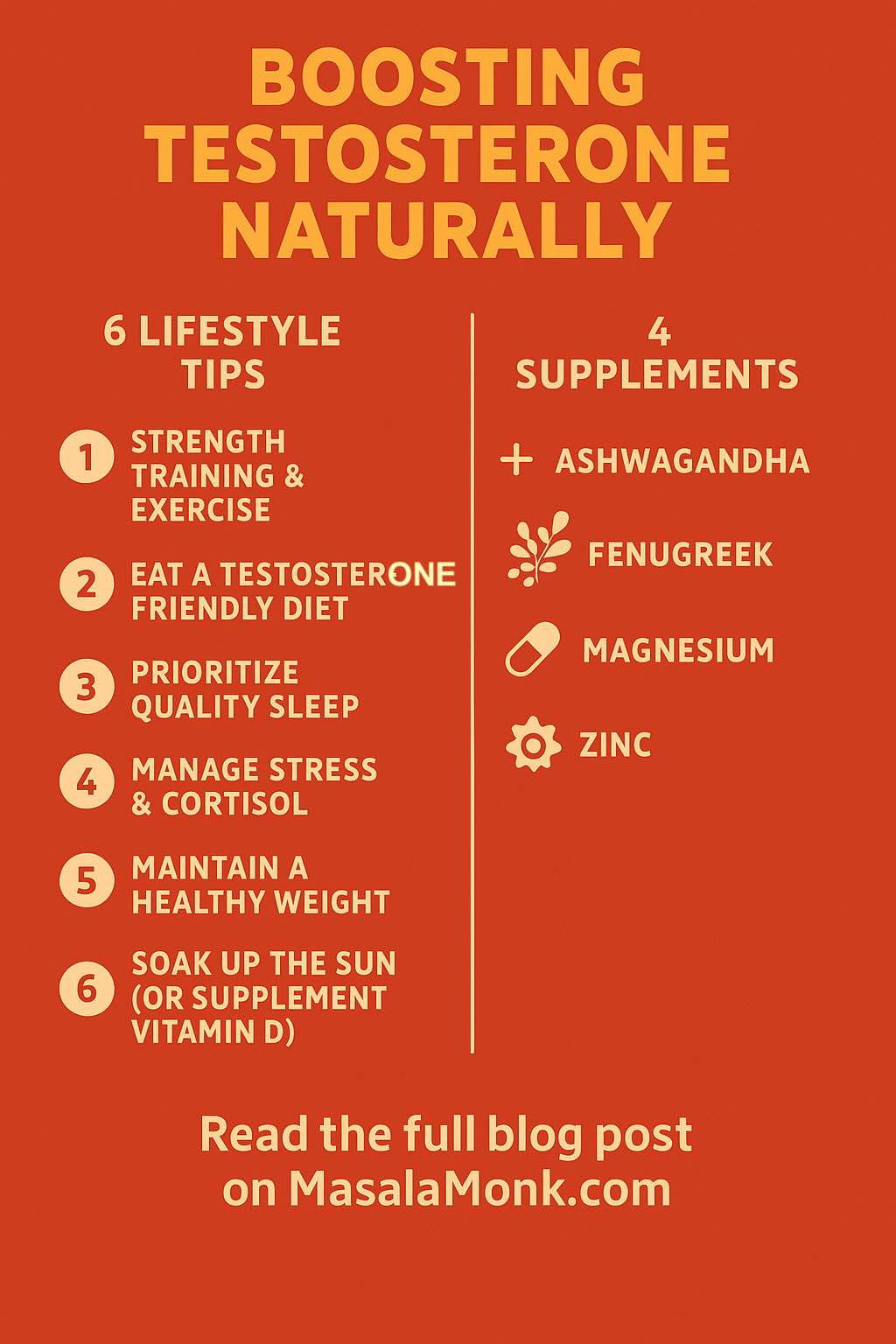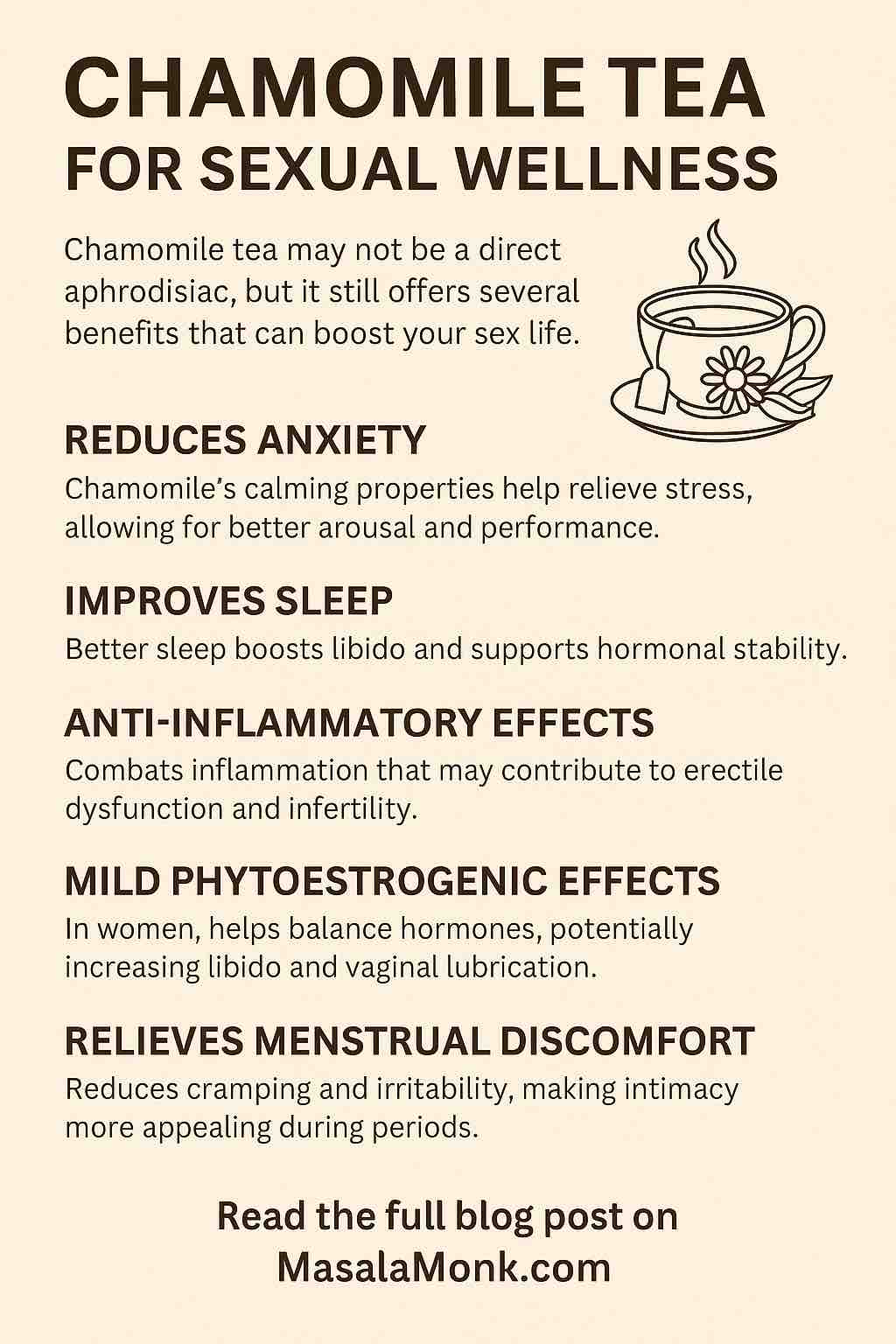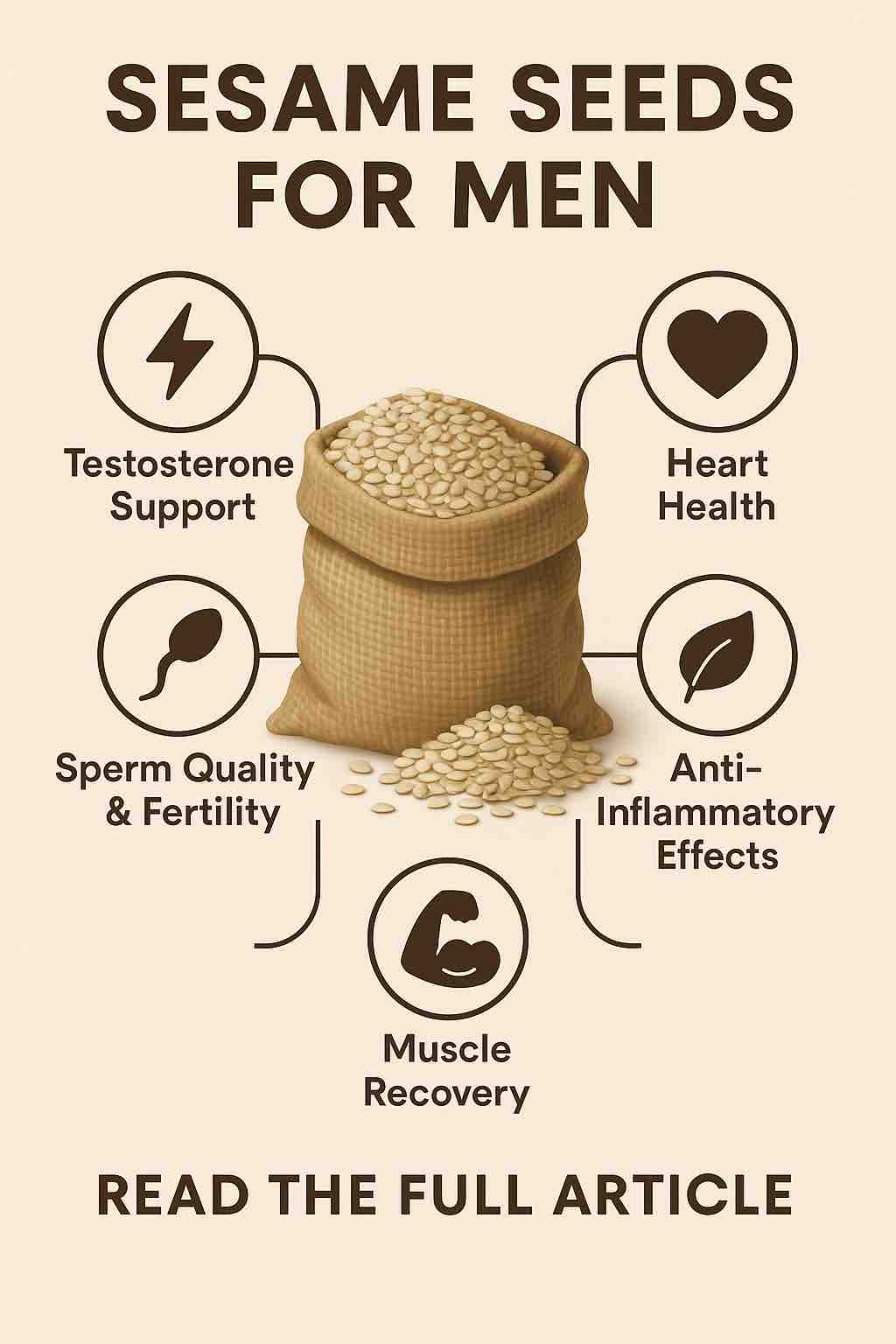
Testosterone is more than just a “male hormone.” It drives energy, confidence, libido, muscle strength, bone density, and even mood. But levels naturally decline with age, and modern lifestyle stressors can accelerate that dip.
The good news? You don’t always need injections or synthetic boosters to support healthy testosterone. Nature, combined with smart lifestyle choices, provides plenty of options. Here’s a research-backed guide to boosting testosterone naturally—with 6 proven lifestyle strategies and 4 effective supplements.
🔑 6 Lifestyle Tips to Boost Testosterone Naturally
1. Strength Training & Exercise
Resistance training—especially compound lifts like squats, deadlifts, and bench presses—has been shown to temporarily increase testosterone. Add in HIIT (high-intensity interval training) for an extra metabolic kick.
👉 Pro Tip: Train large muscle groups 3–4 times a week for the best hormonal response.
2. Eat a Testosterone-Friendly Diet
Your hormones need healthy fats, protein, and micronutrients to function optimally. Include:
- Zinc-rich foods like sesame seeds and shellfish
- Magnesium-rich greens like spinach
- Healthy fats from avocados, nuts, and olive oil
- Vitamin D sources like fatty fish and fortified foods
📝 Related Reads:
3. Prioritize Quality Sleep
Most testosterone is produced during deep REM sleep. Skimping on rest can slash levels by 10–15% within a week. Aim for 7–9 hours nightly—and keep your sleep-wake cycle consistent.
4. Manage Stress & Cortisol
Chronically elevated stress hormones (like cortisol) directly suppress testosterone. Tools like meditation, breathwork, or even a 15-minute walk outdoors can reset your hormonal balance.
📝 Related Reads:
- Garlic and its Extraordinary Benefits for Men
- Cardamom Benefits for Men
- How to Naturally Lower Cortisol Levels?
5. Maintain a Healthy Weight
Excess abdominal fat converts testosterone into estrogen via the enzyme aromatase. Losing even 5–10% of body weight can lead to a 20–30% boost in testosterone.
6. Soak Up the Sun (or Supplement Vitamin D)
Vitamin D deficiency is strongly linked to low testosterone. Just 15–20 minutes of sun exposure daily can help—otherwise, supplement wisely. Talking about Vitamin D supplements, have a look at Top-Rated Vitamin D Supplements Available on Amazon India.
🌿 4 Evidence-Based Supplements
While lifestyle is the foundation, a few supplements show solid promise. Always consult your doctor before starting any.
1. Ashwagandha
One of the most researched adaptogens, ashwagandha has been shown to raise testosterone by 10–22%, especially in men under stress or engaged in strength training. It may also improve libido, sleep, and energy.
- Typical dose: 300–600 mg/day
📝 Related Reads: Effects of Ashwagandha on Testosterone Levels
2. Fenugreek
Clinical trials suggest fenugreek may boost testosterone by up to 46% while improving strength, mood, and sexual function.
- Typical dose: 500–600 mg/day
3. Magnesium
Deficiency is common, and correcting it supports free testosterone levels—especially in active men.
- Typical dose: 200–400 mg/day (through diet or supplements)
4. Zinc
Essential for testosterone synthesis and sperm health. Supplementation helps if you’re deficient, but overdoing it can backfire.
- Typical dose: 15–30 mg/day
📝 Related Reads:
⚠️ Myths & Cautions
- Shilajit is trending online, but many products are contaminated with heavy metals. Use with extreme caution unless from a trusted, tested source.
- Tongkat Ali (Eurycoma longifolia) shows potential but carries safety concerns, including possible liver toxicity.
- Over-supplementing zinc or vitamin D can do more harm than good.
✅ Key Takeaway
Boosting testosterone isn’t about chasing shortcuts. The strongest and safest path is a holistic one:
- Build your foundation with exercise, sleep, nutrition, and stress management.
- Layer in targeted supplements if needed—Ashwagandha, Fenugreek, Magnesium, and Zinc have the best evidence.
- Approach newer or trendy supplements with skepticism and always check quality and dosage.
Your body already has what it takes to thrive—sometimes it just needs the right environment to unleash its full hormonal potential.
🔗 Want to dive deeper? Explore more natural boosters on MasalaMonk:
- Cardamom Benefits for Men
- Garlic and its Extraordinary Benefits for Men
- Understanding the Natural Sexual Benefits of Cloves and Ginger
❓ Frequently Asked Questions (FAQs)
1. What are the main signs of low testosterone?
Low testosterone can manifest as fatigue, low libido, erectile dysfunction, reduced muscle mass, increased body fat, mood swings, and difficulty concentrating. A blood test is the only reliable way to confirm levels.
2. Can exercise really boost testosterone levels?
Yes. Resistance training and HIIT provide short-term testosterone spikes. Over time, consistent training helps maintain higher baseline levels compared to a sedentary lifestyle.
3. How much sleep do I need for healthy testosterone?
Aim for 7–9 hours per night. Studies show even one week of sleeping only 5 hours per night can reduce testosterone by up to 15%.
4. Does being overweight lower testosterone?
Yes. Excess fat tissue, especially belly fat, increases aromatase enzyme activity, which converts testosterone into estrogen. Even modest weight loss can significantly raise testosterone.
5. Which foods help increase testosterone naturally?
Foods rich in zinc, magnesium, vitamin D, and healthy fats are best. Examples: sesame seeds, shellfish, walnuts, fatty fish, leafy greens, eggs, and avocados.
6. Is Ashwagandha safe for boosting testosterone?
Ashwagandha is generally safe short-term and has been shown to increase testosterone by 10–22% in men. Avoid during pregnancy and in cases of hormone-sensitive conditions. Always check quality and dosage (300–600 mg/day).
7. Does Fenugreek really work?
Studies are mixed, but many show Fenugreek can raise testosterone and improve strength, libido, and sperm count. Typical dose is 500–600 mg/day.
8. Should I take zinc and magnesium if I’m healthy?
If you’re deficient, they can help. But in healthy men with adequate levels, extra supplementation doesn’t significantly boost testosterone. Over-supplementing may even cause harm.
9. What about trendy supplements like Shilajit or Tongkat Ali?
Both are popular but carry concerns: Shilajit may be contaminated with heavy metals; Tongkat Ali has limited evidence and possible liver risks. Stick to well-researched, safe supplements first.
10. Can testosterone levels be improved without supplements?
Absolutely. Exercise, proper sleep, stress management, weight control, and a nutrient-rich diet are the most powerful, sustainable ways to support testosterone. Supplements are optional add-ons.













